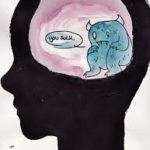I promised that I’d come back to the problem of the internal critic — and how it might be constructive or (more often) destructive when it comes to addiction. This was part of my plan to translate Jordan Peterson’s prognostications into practical advice for people in addiction. Now, two months later, I hesitate to refer back to JP because of the ongoing shitstorm that has clouded his online presence and scrambled many people’s attempts to interpret just about anything he’s ever said. It seems the controversy has caught up with and overwhelmed the content, which is a shame. But it doesn’t matter much for the purpose of this post. Thoughts about the internal dialogue and self-criticism didn’t start with JP.
 In modern times, the idea of an internal critic goes back to Freud, who envisioned a superego that oversees one’s thoughts and feelings, judges them, and dishes out guilt when it finds that they centre on wishes for sex and murder. Fast-forward to the middle of the century and you’ve got object relations theory, where the superego is just as harsh but a lot more observant. It’s not only sex and aggression that you’re guilty of; it’s also greed and envy. A couple of decades later came “transactional analysis,” a lay-person’s guide to an internal parent in ongoing dialogue with a child-self, with an adult self hopefully emerging in between. Since then? There’ve been all sorts of offshoots, but mainly a more optimistic approach, including the current emphasis on self-compassion, in psychotherapy programs like ACT, mindfulness/meditation, and positive psychology in general.
In modern times, the idea of an internal critic goes back to Freud, who envisioned a superego that oversees one’s thoughts and feelings, judges them, and dishes out guilt when it finds that they centre on wishes for sex and murder. Fast-forward to the middle of the century and you’ve got object relations theory, where the superego is just as harsh but a lot more observant. It’s not only sex and aggression that you’re guilty of; it’s also greed and envy. A couple of decades later came “transactional analysis,” a lay-person’s guide to an internal parent in ongoing dialogue with a child-self, with an adult self hopefully emerging in between. Since then? There’ve been all sorts of offshoots, but mainly a more optimistic approach, including the current emphasis on self-compassion, in psychotherapy programs like ACT, mindfulness/meditation, and positive psychology in general.
 Addicts don’t need a history lesson when it comes to the internal critic. Just being an addict is enough to earn you a degree in self-judgment, self-contempt, self-hatred, and all their variants. Self-criticism is often (and rightfully) felt to be highly destructive. It arises from the addictive pursuit of drugs,
Addicts don’t need a history lesson when it comes to the internal critic. Just being an addict is enough to earn you a degree in self-judgment, self-contempt, self-hatred, and all their variants. Self-criticism is often (and rightfully) felt to be highly destructive. It arises from the addictive pursuit of drugs,  drink, sex, or food (and all the nasty things we do in preparation or in the aftermath) and it feeds back to our addiction. Because feelings of shame and guilt, which are the key weapons of the internal critic, are so painful that they magnify the need for pain relief. And we know how to get that.
drink, sex, or food (and all the nasty things we do in preparation or in the aftermath) and it feeds back to our addiction. Because feelings of shame and guilt, which are the key weapons of the internal critic, are so painful that they magnify the need for pain relief. And we know how to get that.
Why is the internal critic so focused on our addictive activities? Maybe because they demonstrate a complete loss of self-control, and being in control of oneself is a cardinal virtue from early childhood (you’d better hold it until you get to the  toilet!) onward. Or maybe because addiction seems inordinately selfish. Maybe because gorging on drugs or booze strikes us as the epitome of greed, and greed is another sin we are scolded for as children. Or maybe because we fail ourselves, we fail others, we lie to ourselves and others, we hurt ourselves and others, we use up the last shreds of self-respect or “authenticity” by indulging yet again when we have promised ourselves to resist temptation.
toilet!) onward. Or maybe because addiction seems inordinately selfish. Maybe because gorging on drugs or booze strikes us as the epitome of greed, and greed is another sin we are scolded for as children. Or maybe because we fail ourselves, we fail others, we lie to ourselves and others, we hurt ourselves and others, we use up the last shreds of self-respect or “authenticity” by indulging yet again when we have promised ourselves to resist temptation.
Peterson reminds us that self-criticism isn’t all bad. And that’s kind of refreshing. He says: “the self-denigrating voice…weaves a devastating tale…Don’t listen to its exaggerated claims that you’re completely worthless. But don’t ignore it either.” Why not? Because self-criticism is the leading edge of self-improvement. We often have no idea how to improve ourselves except by listening to an internal critic. Or an external critic. Some of you may remember the Bob Newhart skit in which the client tells the psychologist about her irrational fears and then about her dismay and guilt at being bulimic (and other addictive tendencies). Newhart, the psychologist, offers the perfect cure. Check it out.
The trouble is that the scorn and contempt we (addicts) level at ourselves reaches levels of intensity so high that, as I said, the psychological pain makes us desperate for relief or — and  this may be just as familiar — we want to punish ourselves for being bad. We know that more drugging or drinking will bring more suffering, so we can combine immediate pain relief with a well-deserved licking, thereby playing the bad kid and the righteous parent at the very same time.
this may be just as familiar — we want to punish ourselves for being bad. We know that more drugging or drinking will bring more suffering, so we can combine immediate pain relief with a well-deserved licking, thereby playing the bad kid and the righteous parent at the very same time.
For many people in addiction, self-contempt is so constant that we assume it’s unavoidable — the brutish background noise of life. But that’s not the case; we can overcome it. When I do psychotherapy with clients in addiction, I try to get the internal dialogue onto the table, and I try to help my clients talk with their internal critic, to participate in the dialogue rather than just taking the abuse.
If I had to specify a model recipe for taming the internal dialogue, here’s what I’d say:
Become conscious of the internal dialogue. Listen to the words (e.g., there you go again, you’re such a loser, such an asshole) and if the words aren’t accessible (because sometimes the critic’s voice doesn’t quite form words) then focus on the tone, the disdain, the contempt, the lip-curling hatred or disgust. Next, try to home in on who’s doing the criticizing. Does it sound like a parent? It often does. We can almost see that glaring, judging, scolding eye watching us. The judgment and scorn are palpable. Who but a parent (or older sibling or teacher) would judge and condemn us like that?
But that doesn’t mean your parent (or sib or anyone else) ever actually spoke to you like that. We have an extraordinary capacity to embellish, distort, and amplify whatever critical messages we might have received as children or adolescents — for being bad, dirty, thoughtless, aggressive, selfish, greedy…all those nasty qualities we’re brandishing again…in our addiction. In fact, the internal parent is NOT a copy or revision of an actual parent. The internal parent is part of ourselves.
 So, listen in. Don’t blot out the voice. Get to know it consciously. Then, as I see it, you’ve got four choices.
So, listen in. Don’t blot out the voice. Get to know it consciously. Then, as I see it, you’ve got four choices.
1. Argue back, wholeheartedly and truthfully. Tell the critic that you aren’t really that bad. Given what you’ve been through, given the challenges you’ve had to face,  you’re actually kind of brave. At least you’re trying, and you’re not giving up. And your addiction isn’t all of you. You’ve got a lot of good features (generosity? honesty? perseverance?) as well. Then access the dialogue at least several times a day. Engage in it as a participant. Defend yourself. That can feel liberating.
you’re actually kind of brave. At least you’re trying, and you’re not giving up. And your addiction isn’t all of you. You’ve got a lot of good features (generosity? honesty? perseverance?) as well. Then access the dialogue at least several times a day. Engage in it as a participant. Defend yourself. That can feel liberating.
 2. Let the internal criticism pass through you, like cosmic rays passing through matter. This approach has most to do with mindfulness/meditation, or Buddhist detachment. The thoughts you’re thinking and the feelings you’re feeling (e.g., shame and guilt) are just thoughts and feelings. Let them come (don’t duck and pretend) and then let them go. There are many guided meditation apps around (e.g., Insight Timer, Buddhify) that can help you learn to let thoughts and feelings come in the front door and leave by the back.
2. Let the internal criticism pass through you, like cosmic rays passing through matter. This approach has most to do with mindfulness/meditation, or Buddhist detachment. The thoughts you’re thinking and the feelings you’re feeling (e.g., shame and guilt) are just thoughts and feelings. Let them come (don’t duck and pretend) and then let them go. There are many guided meditation apps around (e.g., Insight Timer, Buddhify) that can help you learn to let thoughts and feelings come in the front door and leave by the back.
3. And then…if a space opens up, try to fill it with a sense of affection for yourself. Or do that even if you don’t sense a space. There’s no secret formula for this. To paraphrase Bob Newhart, just do it. Perhaps give yourself a squeeze…literally. Put your right hand around your left shoulder and your left  hand around your right shoulder and hug yourself. It’s not as silly as it sounds. There are many methods for trying to increase self-compassion. Google them. But also just try to be kind to yourself. Recall what you’ve been through, recall your good points — as in #1 above. Add a dash of humour. It’s not as hard as you may think.
hand around your right shoulder and hug yourself. It’s not as silly as it sounds. There are many methods for trying to increase self-compassion. Google them. But also just try to be kind to yourself. Recall what you’ve been through, recall your good points — as in #1 above. Add a dash of humour. It’s not as hard as you may think.
4. The last thing to try: When you focus on that critical eye or critical voice, look behind the illusion that it’s someone else criticizing you, and you may very well recognize yourself. It’s kind of a 180. The way I do it is through the pivot point of  anger. Behind all that contempt and lashing out, the critic is angry, and you can feel the anger right there in your own body. That’s you scowling, judging, condemning…yourself. And why are you so angry at yourself? For all the reasons mentioned above, to be sure. But for a whole host of other reasons. You’re alone, you’re misunderstood, you’ve been abandoned or rejected, by people you wanted to be close with, people you wanted to love you. Never mind that you might have done some pretty dumb things to elicit those reactions. You’ve been blocked from accessing what you need to feel tolerable. Drugs soothe you. What right does someone have to withhold them? What right do they have to punish you?! Your anger is legitimate. In a
anger. Behind all that contempt and lashing out, the critic is angry, and you can feel the anger right there in your own body. That’s you scowling, judging, condemning…yourself. And why are you so angry at yourself? For all the reasons mentioned above, to be sure. But for a whole host of other reasons. You’re alone, you’re misunderstood, you’ve been abandoned or rejected, by people you wanted to be close with, people you wanted to love you. Never mind that you might have done some pretty dumb things to elicit those reactions. You’ve been blocked from accessing what you need to feel tolerable. Drugs soothe you. What right does someone have to withhold them? What right do they have to punish you?! Your anger is legitimate. In a  sense it’s natural and fair. But the crazy thing is that, through some psychological sleight of hand, your anger at other people got turned on yourself. It became the hostility of the internal critic. And do you know who came up with that idea? Sigmund Freud.
sense it’s natural and fair. But the crazy thing is that, through some psychological sleight of hand, your anger at other people got turned on yourself. It became the hostility of the internal critic. And do you know who came up with that idea? Sigmund Freud.
If you get in touch with the anger of the internal critic, you can neutralize its destructiveness, because, after all, it’s just you freaking out and being overly strict with yourself. And what’s left, once the shittiness is subtracted, might actually be valuable. Self-improvement is possible. Finding your own self in your internal critic might help specify who you want to become while at the same time providing that lurch of pure self-awareness that makes you feel you’re already halfway there.
 Informed by unparalleled neuroscientific insight and written with his usual flare, Marc Lewis’s The Biology of Desire effectively refutes the medical view of addiction as a brain disease. A bracing and informative corrective to the muddle that now characterizes public and professional discourse on this topic.” —Gabor Maté, M.D., author of In The Realm of Hungry Ghosts: Close Encounters With Addiction
Informed by unparalleled neuroscientific insight and written with his usual flare, Marc Lewis’s The Biology of Desire effectively refutes the medical view of addiction as a brain disease. A bracing and informative corrective to the muddle that now characterizes public and professional discourse on this topic.” —Gabor Maté, M.D., author of In The Realm of Hungry Ghosts: Close Encounters With Addiction
I personally want to thank you for this post, it helped me with my pain and suffering and self-criticism, even self-hatred I feel at the moment – at least for a moment. I severely relapsed on amphetamine a couple of weeks ago.Otherwise it wouldn’t be that bad, but now – referring to previous relapses – I have a two-year-old child. The amount of self-loathing is enormous. She lives with my parents at the moment, and I get to see her ,and if I stay sober for 30 days I can possibly get her back.
I just want to hurt myself physically, that’s why just giving up and start using again pops into ky head from time to time.
Thank you for your blog.
Sincerely, Laura from Finland
Laura, please see the reply to your comment by Renee, below…
I will put a very very powerful spell on my son it will over power the addictions of mind flesh. my son will begin to take heave to my earnings and will begin cutting down drastically. His mind will begin to clear up and balance out quickly and repair its cranium and poles. His negativity will clear out completely he will begin to refocus and stay focus. Those who are attacking him through his weakness will be destroyed with the effects they intended for him
Thank you, Marc, your posts are much appreciated! It’s nice to hear such practical and comprehensible guidance from someone with such deep understanding of addiction.
Thank you for this post! I am almost 1000 days drink,drug and medication free. The more I learn and understand this dialogue with myself the happier I become, I use meditation to help with my internal thoughts, but all four examples will really help!! Bless you 🙏❤️
According to Jiddu Krishnamurti the Roots of Psychological Disorder stems from the sense or idea of the self. In reflecting back on my early days of drinking and drug use often I felt intense guilt and/or shame. However, I drank and/or used drugs regardless of how I was feeling good or bad but many times I was feeling the “poor me”, poor me”, ” pour me a drink” syndrome. Living in the moment, feeling good or bad, at the time, it always seemed like a good idea to use, again, “at the time”. However, using usually deepened feeling of guilt, shame and depression. Moving aside from myself, regardless of my upbringing or exposure to family dysfunction, “I” was responsible to do something about this “Me”. I am reminded by the poem and Autobiography In Five Short Chapters by Portia Nelson which actually helped me see with some clarity my own demise back in August 1988. In order to get out I had to go in!~
I’m so glad and fortunate to have such a distance from those strong feelings of guilt and shame, so inwards bent, someone once said etc.
Hi, Marc: I appreciated the post – and have one more layer for you to consider. Some folks grew up in households where they were regularly demeaned, judged, shamed, and criticized. Those people learned that their primal need for attachment coincided with abuse and condemnation from caregivers. It was a horrible choice – be attached to an abusive caregiver, or face abandonment.
As social monkeys, we are wired to turn to attachment relationships in times of stress. If we grew up with attachment that took the form of criticism, what will we do to feel attached? Seek out criticism, judgment and shame. “I may be a piece of shit, but at least I matter enough to be criticized and shamed.” Certain strict religious or moralistic communities or dogmas might be sought out. In a sick way, it all feels like home (because home was a sick place), and it’s better than just facing our loneliness, stress, anger and grief unleavened. There’s actually a payoff in the self-criticism. It reminds us what it was like to be cared for, and replays the lesson of childhood – parental attachment (value, safety) is given to kids who are bad, and comes with lots of criticism. The self-criticism may in fact be a form of self-soothing.
Thank you for this, Fred. This is a really important addendum and I hope others will read it. I want to take another look later. Right now on my way to Detroit airport.
Thanks Marc
For me. I have found internal dialogue with the voice its self to be unimaginably powerful. Credit goes to Craig Perra and the Mindful Habit. Basically asking 2 questions. Where does it come from? )give it a face and sound and a time and see how old I am feeling when the criticism comes… Developing that over time.. then asking.
What does it need? often relief or love or peace or…. If the answer is unhealthy I ask that answer the same questions as self deprecation comes in many forms. Really its a gift showing us what we really need. We have the power to choose a healthy or unhealthy expression of it. Objectively they are just choices and our belief system attached to the inner voice is what guides us to choose. Changing our wrong indication, by understanding what the voice is needing shifts our paradigm.
I have found when I dialogue with the unhealthy, those thoughts are simply yearning for the good, but are sourced from beliefs of being unworthy or incapable. Often bound in early years and and wrong indications. So some love and understanding helps to relieve the desire.. Then slowly, a tea/walk/meditation/hug/talk/exercise instead of a cigarette/drink/sex/drugs makes one feel a higher sense of relief.. Insert many other vices/healthy behaviors here…
My most profound break through with this was with suicidal ideation.. I have had it since childhood. But finally broke thru the distress of it with dialogue when I realized internally that I wanted the pain to end…. Not necessarily life but the feeling I had…. Now sounds simple… One can tell that to someone who is suicidal and they may not get it. But when discovered internally it was profound… Now thoughts of suicide or self harm are butterflies from the mind reminding me to look after myself in the most gentle of ways…
Thank you again for you work and sharing…
How about the battle with both internal and external expectations and the inevitability of falling short leading to the Im not good enough, smart enough, loved enough etc. and so on right down into the cesspool of degraded self esteem.. It is really all about mastering the mythologies of the internal conversation.
Long story short for me Ron is Yes.
If I master the internal world, the external world can do what ever it does.
I do not have control over it, only over how I work within it.
The idea of a cesspool of self image is our own… We innocently pick up wrong indications about ourselves, but they are our own and what we have to work with. I believe they are often traumas: personal, passed down familial and societal.
To me it is about adjusting our belief systems because they power our lives and how we react. They control the part of our brain we react from. A simple shift in awareness about stress and feeling uncomfortable makes it far more bearable and even exciting. Once one realizes the thoughts of failure are always on the road to achievement they are no longer an immobilizing entity. They become a mile marker on the journey…..
This is not an easy or difficult process. It is a personal process. Many of us are addicted to beating ourselves down, and thinking negative about ourselves.. It provides safety in its own way. But if its no longer serving and one wants to move one……
Where does it come from? What does it need?
p.s. I am a work in progress. sometimes it works great. sometimes I am addicted to the struggle.
…”It is really all about mastering the mythologies of the internal conversation.” …yea, it is. And at a certain point, being a certain type of person, that just became too exhausting, so I cut my losses. I just couldn’t spend one more mili-second policing my thoughts and intentions.
Hi Bill,
No, I wouldn’t call any of this “simple.” Also, to experience the inner voice in relation to a particular age, and to be able to view it as a gift, to be able to choose how to receive it….these capacities must have arisen through some pretty intense work, or meditation, or some other way of focusing inward. I commend you for this! What you say about the voice, and its “needs”, makes absolute sense to me. I think of my voice as desperately seeking to avert negative consequences by keeping me in line, but in a rough, inconsiderate, childish (!) way.
Anyway, for most people, especially in addiction, it’s nothing like a gift. It’s more like a demon pursuing them from pillar to post. But I grant you that it can become a guide and even an intimate friend over time.
Hi Marc,
Great post and such valuable info. In response to Laura Tiainen’s post – i just want to say hang in there, relapses are painful but your doing GREAT because you are trying to change. Amphetamines were my drug of choice and I haven’t used for 16 months now. I just tried to see every day as a new day to start again, and eventually the days turned into months. Laura hang in there, all the best.
Renee (australia)
Great to hear, Renee. I’ve put a marker following Laura’s comment so that she’ll see your message to her.
Thanks for mentioning Newhart in this! His Dr. Switzer character became a sort of role model for me with my own critical inner voice. (Unfortunately, when I worked as a therapist, this wasn’t acceptable behavior:) It’s helped me, though.
I love that you just wrote about this, Marc, and I was just sharing about it this week in a meeting. I treat my critical voice the way I do any other self-sabotaging behavior – it’s part of my bottom line now, one of the things I don’t do because it’s not effective for me.
I told this to a fellow in recovery who said, “But how can you DO that? How can you say to yourself, ‘Stop it!’ and actually stop it?”
What’s wonderful about living in two worlds – the world of 12 Step fellowship and the world of neuroscience – is that I have loads of support for the “Stop it!”
It’s not automatic and unconscious anymore.
Thanks to 12 Step fellowship, I have friends with similarly self-destructive history and patterns who can help me notice if/when I’m trashing myself – which I don’t do anymore but, if I did, I can be certain they’d tell me to Stop It, in part because who the hell wants to listen to that? I don’t even want to listen to it myself.
Thanks to neuroscience, I have friends like Mark Brady and you (Mark and Marc:) who remind me about practices like meditation and help me recall that I can, in fact, extinguish behaviors that no longer serve me. I can, in fact, stop it.
I can do that by initiating – and repeating – other behaviors that do serve, thereby creating new, more enjoyable neural pathways, new synaptic wiring. I can also do it through other kinds of redirection, and through pairing, reframing, responding to the voice as one that’s (ineptly) there to help me somehow, and so much more. I also know now that I got a (paradoxical) download of pleasurable chemicals when I’d diss myself. In The Biology of Desire, you reminded us that we’re so much more than we’ve been taught we are, and capable of much more, too.
So thanks for this opportunity to riff on something I love: the power within each of us to Stop It… and do something that serves us better, once we learn how to do that, get support for the change, and practice it.
Thank YOU Joanna, for making “stop it” into a strategy, or really a set of strategies, rather than a joke. This is a perfect complement and afterword to my post. What you’re describing is to really take the reins and be the boss…of oneself. And why on earth shouldn’t we be able to do that? I guess it’s difficult because that voice seems to muster a kind of authority beyond what we imagine might belong to us, and because it’s really hard to figure out what that voice is, where it comes from, who’s behind it. To make the voice conscious, to see that it’s not automatic…those are indeed the skills we need to assume self-control.
I can find lots of reasons why it can be so challenging to “be the boss of oneself.” Many of them seem to be related to how stress hormones compromise executive function day to day, moment to moment. A simple, recent example, I went to sell 1000 shares of a stock that was spiking on good news. The adrenaline surge compromised my attention-paying ability and I didn’t notice I had only typed in 100 shares. My the time I realized my mistake, the spike had retraced and I’d lost $1000. And these kinds of attentiion-paying challeges occur daily in all kinds of areas.
Here’s a recent research article (today) showing how Adverse Childhood Experiences very likely are connected to this and all kinds of other challenges and deficits … https://www.elsevier.com/about/press-releases/research-and-journals/childhood-adversity-increases-susceptibility-to-addiction-via-immune-response
All I can do in the face of this growing understanding is have compassion for myself and others.
Hi Marc – you suggest this critic “arises from the addictive pursuit of drugs, drink …”. My feeling it is there long before drugs enter the equation and low or non existent self esteem is a root cause, itself with multiple possible causes but trauma and lack of attachment are main ones. Someone who cares about themselves would never treat themselves like addicts do. Recently I have been involved in some work on developing what is called Compassion Focussed Therapy, an offshoot of CBT which works to have a person see and treat themselves better – and antidote if you like to chronic self hatred. However I also know in my own case that even though I have overcome destructive habits I still have a very critical view of myself many years alter. I also have anxiety still. These things reduce but never completely leave. Of course the stigma and judgement of society doesn’t help when they also see drug users as scum and not worthy of the same compassion others are now given
Marc, Thanks for this. One of the angles I have always described my own motivation to use the drugs (and seek the behaviors) that became my addictions was to give me a break from my incessant mind. But it wasn’t just randomly incessant, it was a mind busy with deeply painful negative messages about the uselessness of trusting life, in my case. Over the years the voices and messages sort of melded together into some sort of cacophonous mental noise that infected every moment of my consciousness (and probably non-consciousness since I had sleep problems, too). It was a painful burning that opiates seems to deal with so perfectly, though I couldn’t have described this at the time. Even years into traditional abstinence, this mental condition followed me. I’ve learned a lot about its emotional roots, since then, but even my intellectual understanding of its genesis, although helpful in other ways, had almost no affect on its persistent presence–it was (and still is, less incessantly) a constant. It is a deeper habit than my drug addictions ever were. I love the idea of engaging the unconscious internal dialogue with conscious discussion. I have also found that meditation gives me the space not to be so automatically affected by the internal talk, giving me the space to actually hear the messages (though they was too loud for me in the beginning of my recovery to sit in meditation safely). I often like to look at addiction and recovery as a problem and solution of consciousness. Again, thanks.
Kinda funny coincidence—my psychiatrist referenced that same Bob Newhart skit on Monday, in response to me asking him why he never asked me about my past, or never seemed to pursue topics like emptiness and apathy that I mention often.
I hadn’t seen the sketch, and couldn’t quite follow it as he described it, but thanks to this link I did watch, and now I think he was citing it to describe that we can talk about X for 5 minutes or 5 years, but in the end, my advice is always going to be “Just stop it.”
I think you are using to illustrate a different point here, but I’m not totally clear what that is…
I appreciate the humor + entertainment value in the sketch, but also found it infuriating. Then I thought maybe we have it framed wrong, as people seeking help from a therapist—we aren’t there because we want to get better, we’re there because we don’t want to get better.
Yes, it’s supposed to be infuriating. If “just stop it!” worked, psychiatry and clinical psychology wouldn’t exist. The problem is that, while effort and intention are indeed critical elements of change, change isn’t something you can flick on with a switch. People try very very hard to get over their phobias, obsessions, addictions, and so forth. It isn’t a lack of effort that’s usually at fault; it’s a lack of strategy, support, knowledge, and alternative ways to move forward.
For some, realizations about your addiction CAN be like a switch, and become landmarks in ones life.
For instance;
Years ago, someone said this to me during a traumatic breakdown I was having at one of the recovery facilities;
“….if you don’t believe you can recover, no one can help you”.
Another landmark realization during my recovery was this:
I said;
“I don’t think I could have gotten this far in life without drinking.”
and someone replied:
“You can also say, “you have gotten this far in life DESPITE the drinking”.
Although only sentences, they were experienced at critical times in my personal recovery process and forever changed my feelings and understanding about my addiction.
Realizations like these can “resonate” during the recovery process, but
their profundity and effect cannot really be “passed on” or considered “advice” per se.
And although the change from “addict” to “former addict” took time, realizations like this can hit instantly, like a switch.
Marc, In the fourth choice you wrote; “..and you may very well recognize yourself.”
One of the big realizations that can lead to freedom from an addiction is when
an addict realizes that the Judge, the Jury, the Plaintiff, the Defendant,
the Arresting officer, the public, etc, are all the same person… that being yourself.
To no longer be stuck this perplexing, addiction-based and exasperating scenario on oneself, is such a relief.
It is probably is one of several reasons why many former addicts don’t return to
an addiction.
In fact, realizations like this can become a series of positive “Ah-ha” realizations an addict may have during their recovery process.
Although these “ah-ha’s” stem from self-criticism, they can lead to a freeing sense of self-awareness like this.
Here are 2 recent pieces in the NY Times that are emblematic of the counterproductive approach to addiction treatment in the US. How helpful is this backwards-ass legislative perspective in a person’s attempts to mollify their internal critic? How helpful, compassionate and hypocritical has this overmedicalized “disease” approach become?
In this milieu, continuing to feel like I’m a worthless piece of shit makes perfect sense to me.
https://www.nytimes.com/2018/07/20/opinion/sunday/opioid-addiction-treatment.html
https://www.nytimes.com/2018/06/04/health/drug-addict-relapse-opioids.html
Marc, yes, addicts don’t need a history lesson when it comes to the internal critic,
but many addicts can help themselves by noticing any changes that may be happening ..no matter how small or tiny, during the seemingly endless forward-and-backward directions that occurs during the recovery period.
A self-critic is also a self-con-fi-dant, so being on the lookout for any, “crack-in-the molds” of thinking, feeling or behavior could be helpful.
Even a single tiny change that is noticed, can possibly lead to a string of “ah-ha” type-realizations in a Addicts recovery process.
Although strength and vigilance are necessary for the self-policing during the recovery process, ultimate realizations may occur.
Absolutely. It’s hard to keep fighting, defending, escaping, etc, when the perpetrator is recognized as your own self. In fact an aspect of self who means well but dishes out criticism like an angry 6-year old.
A percentage of addicts believe it is indeed themselves they are fighting, defending, escaping. etc.
And another percentage believe it is the effect of a disease.
Curious in what ways self-criticism differs too.
Thanks for this great post, Marc. And the wise comments, all written from places of deep experience.
In my 3 years of recovery from alcohol misuse, the first 6 months were easy, but then I was left with me: the very person I’d been running and hiding from for 5 decades. It was shattering on every single level. Open Dialogue therapy in the UK helped a great deal (and free, via the NHS – a Godsend for sure!) but I had to take FULL responsibility for healing myself.
Yes, like some here, I’m the survivor of a traumatised family (verbal abuse is as bad as physical abuse, and leaves a dark legacy), which I then repeated in my own family, sadly. I was left with oceans of guilt and anger after I quit drinking.
SO, I had to accept my inner critic and her pain, and let her speak to me and tell me of all her hurt, her resentment and deep, deep anger. And then forgive – not forget – every single person who’d ever hurt me (I’d probably returned the favour at some point.)
Mindfulness, prayer, but most of all gratitude and yoga have been instrumental for bringing me back to much deeper self-awareness. When I get very angry, I can use it to set boundaries, be assertive and avoid that situation/person in the future. And if I can’t, I now have a set of tools to deal with the situation proactively, coming away with a “Yessss!” not a tired set of self putdowns.
I welcome all thoughts now, then reframe as necessary. I constantly remind myself of all the good things and people in my life, all the good things I’ve achieved and congratulate myself for being “good enough.” I was NEVER taught that as a kid, by anyone: my parents, nor my wider family and teachers. It led to constant striving and judging – so exhausting, and so inevitable for me to misuse alcohol to cope. Shit!
So trauma + unrealistic expectations + exhaustion at not being good enough: the catalyst for addiction.
Well, I AM good enough, as I believe everyone here is. There’s a peace and acceptance in that.
Lovely to read this, Annette. Your advice is exquisite. My only question is about “Open Dialogue therapy”. Can you explain this in a couple of sentences, in another comment?
Congratulations on a fabulously well-executed project of self-reconstruction and healing. I hadn’t thought much about forgiveness, but I can see how important it is.
Hi March, Open Dialogue was conceived in west Lapland, Finland in the 1980s, based on the premise that psychotic episodes are a natural attempt to get well following trauma. The entire family and even close friends, are invited to take part in the sessions. It is an open dialogue, because clinicians are there to listen and sit with the pain and insights which emerge, rather than diagnose. Sessions can last up to 3 hours (as my first one did.) The emphasis is on the client leading the therapy, to diminish or even remove the need for medication.
It’s practised in the US. I think it’s an excellent therapy for people in recovery as it gets to the root causes of why we’re addicted: our family ‘myth’ if you will, and helps us to create a new, more empowered reality.
http://open-dialogue.net/
Hopeful progress simply by stopping the use of the term “addiction,”
https://acestoohigh.com/2017/05/02/addiction-doc-says-stop-chasing-the-drug-focus-on-aces-people-can-recover/
thanks you providing such valuable information….its very helpful to all…keep on providing information which are helpful all